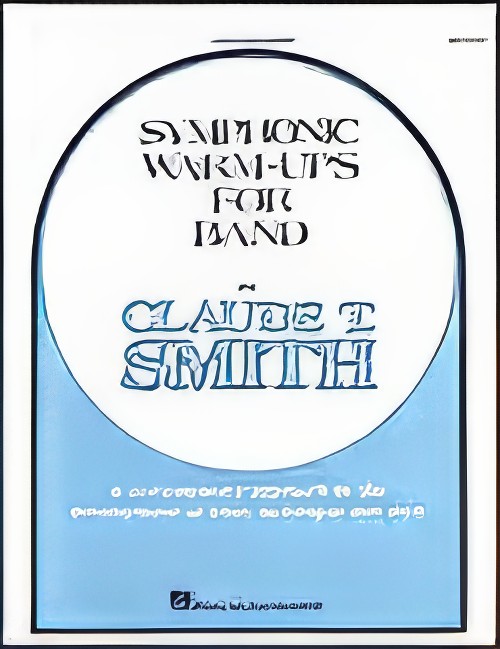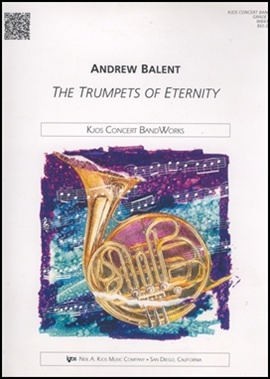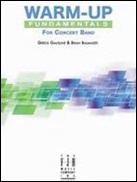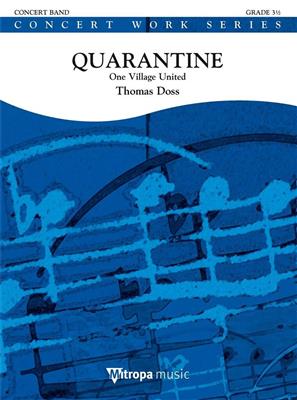Results
-
 £5.99
£5.99SYMPHONIC WARM-UPS FOR BAND (Tuba) - Smith, Claude T.
Claude Smith's contemporary approach to teaching technique, tone and style is written in a variety of keys and meters and is divided into three sections: I. Scale Studies II. Etudes III. Chorale Studies. The etudes and chorales are in progressive order of difficulty so bands of all levels can find appropriate starting places and progress from there. It's the perfect way to begin every rehearsal.
Estimated dispatch 7-14 working days
-
 £89.99
£89.99The Shining Star Wind Band Set (Score & Parts)
Start your Christmas concert in a different way! This brilliant march, composed in the British march tradition, of Peter Graham is based on the famous song "O Come All Ye Faithful" (Adeste Fidelis). Begin uw kerstconcert eens anders! Deze briljante mars, gecomponeerd in de Britse marstraditie, van Peter Graham is gebaseerd op het welbekende lied 'O Come Al Ye Faithful' (Adeste Fidelis). 03:45
Estimated dispatch 7-14 working days
-
 £137.99
£137.99Theme Park Fun! Wind Band Set (Score & Parts)
In Theme Park Fun! your orchestra pays a visit to an amusement park. During your visit, you will experience some spectacular rides and attractions this theme park offers. The uniqueness of Theme Park Fun! is the interplay between music and (moving) images. Animations and illustrations support the visual composition.Part 1: The Entrance & Parade [with animation]The opening of the park is a fact. A day full of fun and pleasure awaits! You and the other visitors will be confronted with all the rides, attractions and adventures the theme park has to offer. Which ride shall we do first?! There is so much to do and experience on this day in the park! A parade of colorful floats and park figures is passing by.Let the fun begin!Part 2: The Haunted House [with animation]The only ride in the park that is not related to fun, is the Haunted House. Here visitors will be challenged to visit a house full of ghosts, creepy figures and other ominous things. The clock strikes twelve, there is no turning back. Ghosts are whispering, yelling, screaming... Fortunately it is almost one oclock, so we can leave this creepy place quickly.Part 3: The Swinging Galleon [with illustrations]What a huge pirate ship! Each time you swing back and forth, you will feel that weird feeling in your stomach. When you are thrown completely into the top you will have a fantastic view over the park, but you can not enjoy it for long. Before you know the ship swings back the other way.Part 4: The Fairy Tale Ride [with illustrations]After all those exciting and spectacular rides and attractions, it is time for a peaceful tour in The Fairy Tale Ride. Surrounded by a fairytale setting, you will discover fable figures, talking animals and colorful designs. Such a beauty and tranquility. Having had this experience, we are ready again for the big rides in the park!Part 5: The Bumper Cars [with illustrations]Now its time to crawl behind the wheel of the Bumper Cars! Shall we all chase the conductor?! Before you know you are hit by another visitor or you will bump against someone else. In this tough ride you can prove yourself as a real driver, or perhaps as a really bad one.Part 6: The Roller Coaster [with illustrations]The largest, fastest and scariest ride in the park ... we should definitely do the Roller Coaster! All together in the train, the over-the-shoulder restraints are lowering... be ready to ride. The train leaves the station and is heading for the big lift hill. It will be very scary when the train reaches the top and the train will be plunged down the first drop! Loops, corkscrews and other spectacular coaster elements will follow... Before you know it, the ride of your life is over. Shall we ride it again?!Part 7: Leaving the Park [with animation]Unfortunately everything comes to an end. This day in the theme park is over, but we have a lot new experiences to talk about! The memories of all the funny and spectacular rides will come up when we walk through the park to the exit. Just one look over the shoulder, the amusement park figures are waving at us. Hopefully we will come back again soon! 14:30
Estimated dispatch 7-14 working days
-
 £58.95
£58.95TRUMPETS OF ETERNITY (Concert Band) - Balent, Andrew
Trumpet fanfares begin The Trumpets of Eternity, but the rest of the band gets to share in the glory, too. A rhythmic bass line in the low woodwinds and tuba accompanies a lyrical melody and countermelody in the clarinets and flutes. The final appearance of the cascading section catches the listener by surprise before leading into the coda.
Estimated dispatch 7-14 working days
-
 £70.00
£70.00WARM-UP FUNDAMENTALS FOR CONCERT BAND - Balmages & Gausline
Warm-up Fundamentals was conceived as a tool for directors to use as part of a daily ensemble routine. It covers important fundamental concepts such as breathing, long tones, interval slurs, articulation, flexibility, chords and chorales. Each section breaks concepts down to their most fundamental elements before integrating them together. This gradual approach to the ensemble warm-up helps extend the practical applications of these exercises well into rehearsals and performances. Each instrument part fits on one folded piece of paper, so it's extremely practical in size and can easily fit inside a folder without issue. These warm-ups are also ideal for guest conducting appearances such as honor bands, where conductors need to achieve a uniform sound in a short amount of time. Topics include: Breathing - Build breath support and lung capacity; Long Tones - Approached with phrasing in mind; Interval Slurs -- Both descending and ascending; Articulation - Designed to promote air flow in addition to clarity and speed; Flexibility - Octave studies for woodwinds and lip slurs for brass; Chorales - Progressive chorales that begin with small interval movement and short phrases to allow focus on sound and intonation; Balance - Focus on section, instrument family and full ensemble; Phrasing - All exercises are designed with ensemble phrasing in mind; Efficient - No big part books! Individual parts easily fit into folders and allow for quick navigation to save rehearsal time; Practical - Ideal for guest conducting appearances; Introductory Text - Discusses each section in detail and provides suggestions
Estimated dispatch 7-14 working days
-
 £211.80
£211.80Karneval i Paris - Johan S. Svendsen
Johan Svendsen (1840-1911) composed "Carnival in Paris" in 1872, inspired by the energy and vibrancy of the Parisian carnival celebrations. The piece showcases a variety of moods and orchestral colours, ranging from jubilant and playful sections to more lyrical and elegant passages. It is a lively and colourful work that reflects Svendsen's skill in orchestration and his ability to capture vivid, festive atmospheres in music. In "Carnival in Paris", his Nordic musical roots meet the cosmopolitan influences he encountered while living and working in major European cities. The work has become one of Svendsen's most popular and is frequently performed in concert halls and festivals. About My Transcriptions for Wind Bands Ever since I started playing the clarinet at 8 or 9 years old in the school band "Blveisene" in my hometown of Gjvik, playing transcriptions of orchestral music has been a natural part of the repertoire. In regional bands, Norway's National Youth Band, and during my 10 years in a Military band, I played many such transcriptions. These transcriptions often included handwritten parts, masterfully crafted by colleagues in a time when music notation software didn't exist. Similarly, the scores were often incomplete, typically featuring just a solo clarinet part and condensed score in Bb. The transcriptions also contained parts for instruments like the Eb cornet and multiple tenor horns, but no saxophones, which made them less suitable for modern wind bands. The rise of many skilled Concert Bands and the increasing demands for scores and accessibility made me realize that someone needed to preserve this tradition. The reason I've transcribed these works is to ensure that you can play or conduct a repertoire that I believe has a rightful place in Norwegian Wind Band tradition. These transcriptions are my contribution to preserving some of the unique works in Norwegian music literature. Creating a transcription is a complex task, and I believe the score of "Carnival in Paris" is one of the most intricate I've undertaken. The first part of the process involves entering the entire orchestral score into music notation software. This is time-consuming and requires meticulous work. The next step is to check several editions to see if there are any discrepancies. Mistakes are often found in orchestral material, which can lead to further errors in the transcription. After that, I listen to many different recordings while following along with the score, paying attention to how different conductors emphasize balance and timbre. Gradually, I begin to note down passages I believe will work well for wind bands. One particular challenge in this piece is that the woodwinds and strings operate in the same register. In the original, the tonal difference between the strings and winds helps to clarify the individual musical lines. In the transcription, I've tried to address this by separating the lines, for example through octave adjustments, and highlighting them without compromising other aspects. I've also used some mallet percussion to broaden the tonal palette. There are countless decisions to be made to create a product that will hopefully allow future generations of wind band musicians to play this repertoire. - Stig Nordhagen -
Estimated dispatch 7-14 working days
-
 £118.99
£118.99Princess Mononoke, Medley - Joe Hisaishi
Series: New Sounds in Brass (NSB); Duration: approx.8'50"; Composed by Joe Hisaishi; Arranged by Takashi Hoshide. Arranger Takashi Hoshide says, "I have selected beautiful melodies from the soundtrack of 'Princess Mononoke' (1997, directed by Hayao Miyazaki) and arranged them into a medley. What can be said about these songs as a whole is that they combine a grand continental scale with the delicacy that reflects Japanese emotions. Since there are no upbeat songs in this selection, I had to work hard on the arrangement, but this allowed for creating contrasts and transitions between each scene in the performance. 'Ashitaka Sekki (English title: The Legend of Ashitaka)' - 'Sekki' means a story that is not recorded but passed down orally. In this anime, this can be considered a sub-main theme. The song starts with a feeling that the story is about to begin and, once the theme kicks in, aim for a grand performance to convey its scale. 'Encounter' - This is the music that plays during the scene where the protagonist Ashitaka meets San. Interestingly, the motif of the main theme 'Princess Mononoke' is used in this melody. Here, let's pursue the shifts in the timbre of individual phrases, creating a beautiful and aesthetic soundscape. 'Princess Mononoke' - This is the main title of the anime. The melody line is carried by horns and trumpets."
Estimated dispatch 7-14 working days
-
 £53.95
£53.95High Desert March - Steve Hodges
High Desert March, by Steve Hodges, is a march that captures the excitement and occasional drama of a long hike in the high desert. Adventure awaits as the young hikers begin their trek, prepared to overcome any obstacles that may come their way.
Estimated dispatch 7-14 working days
-
 £119.99
£119.99Quarantine - Thomas Doss
Like a dark veil, an ominous sense of foreboding takes hold across the world. A looming danger, one previously unknown to mankind, slowly approaches, bringing our daily lives to a grinding halt. A perilous virus gives us no choice other than to stay in our homes, leaving us unable to work in our offices or even visit family and friends. Something that has only been talked about in history books is coming to pass: a pandemic! The invisible danger expands more and more, and we feel paralysed by fear and fright. The distance between us and our fellow human beings increases. At the same time, we start to better understand something crucial: we have time again! People help each other out. Neighbourly assistance and support within one's own family becomes more apparent. We stand by each other. Suddenly we have the time for things that we did not have before. Time for reflection... A new era commences. Finally, hope reappears. We leave our houses, but nothing is quite the same anymore. With renewed strength, people begin to perceive the future in a positive and optimistic way once again. With greater attention and awareness of the here and now, we feel that, despite it all, we can be happy.Recorded by the Kobe College Wind Orchestra and its conductor Satoshi Yagisawa
Estimated dispatch 7-14 working days
-
£106.95
Passerine - Carl Strommen
Based on a Newfoundland folk song, Passerine refers to "the swallow" found in the lyric of this song of lost love. Carl Strommen gives us an exceptionally beautiful setting of this folk song that contains a transparent orchestration to begin the work, contrasted nicely with the later entrance of the full ensemble. Your ensemble will enjoy reflecting the romantic sentiment of Passerine broadly and with great expression.
Estimated dispatch 7-14 working days
